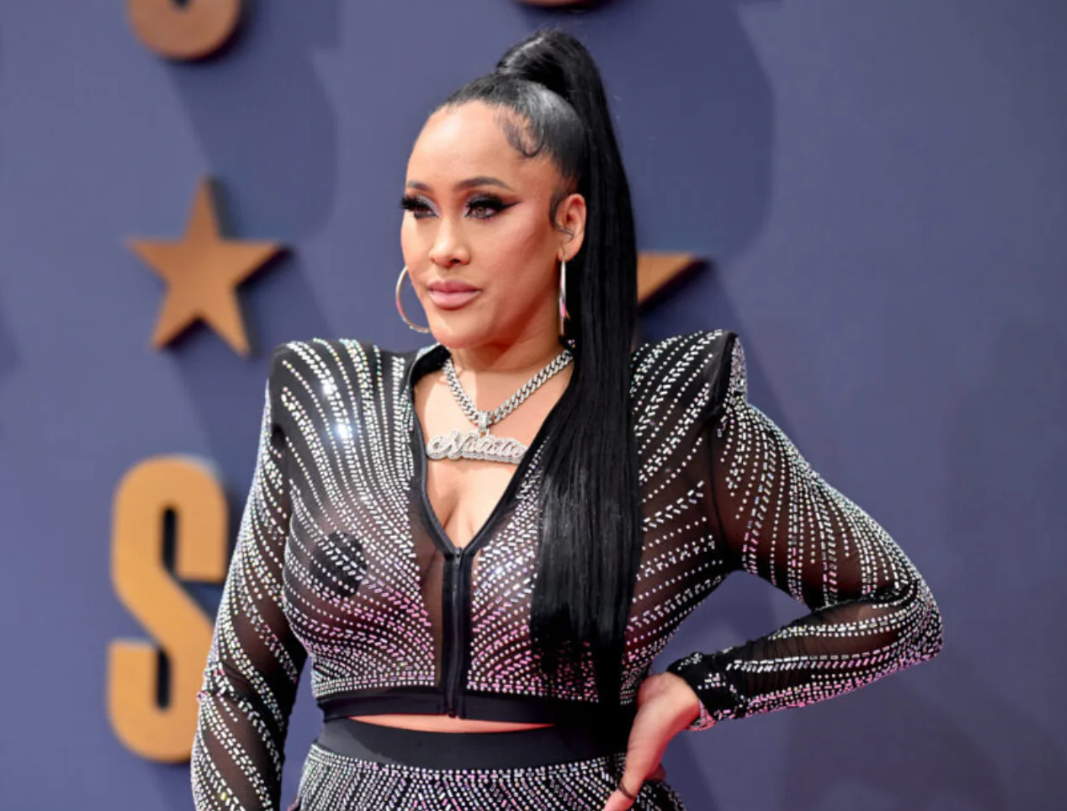Natalie Nunn: American Television Personality
Natalie Nunn is a recognized figure in the American television industry, primarily known for her memorable role in the reality series “Bad Girls Club.” Born on December 26, 1984, in Concord, California, she was raised in a family deeply rooted in athletics, which led her to pursue and excel in track events during her early years. Her television debut came in 2009 when she joined the fourth season of “Bad Girls Club,” where her commanding personality and unabashed demeanor quickly made her a standout among the cast. Despite the controversies she faced during and after the show, Nunn continues to remain an influential personality with a significant social media following.
Following her stint on “Bad Girls Club,” Nunn went on to participate in other reality television shows, including “Love Games: Bad Girls Need Love Too,” and “Marriage Boot Camp: Reality Stars.” These appearances further cemented her status as a television personality. Her confrontational and forceful approach, while often leading to clashes with fellow cast members, has unquestionably made her a compelling figure to watch.
Apart from her television career, Nunn has also ventured into other fields. She released a book titled “Turn Down for What” in 2013, where she shared her personal experiences and the lessons she learned from her time in the limelight. She has also pursued entrepreneurial endeavors, launching her cosmetic line, “Natalie Nunn Cosmetics,” and a fitness program, “No Payne, No Gain.”
Her personal life, too, has been a subject of public interest. She married Jacob Payne, a professional football player, in 2012, and their relationship has been a significant part of her storyline in several reality shows. They have a daughter together, Journey Ruth Payne.
Nunn’s journey in the entertainment industry is marked by her resilience and determination to succeed. Despite the controversies and challenges she has faced, she has managed to maintain her relevance and continue her career in an industry known for its fleeting fame. Her bold personality, combined with her desire to share her personal experiences and insights, makes her an intriguing figure in the world of American television. She is a testament to the power of authenticity and tenacity in the face of adversity.

Background and Early Career
Growing up in a small town in Nebraska, Samantha’s initial years were steeped in the simplicity and closeness of a tight-knit community. Her parents, both educators, instilled in her an insatiable curiosity and a deep love for learning. Throughout her formative years, she was consistently at the top of her class, earning numerous accolades for her academic prowess. Her voracious appetite for knowledge was evident in the broad spectrum of subjects she excelled in, from mathematics to literature.
After graduating from high school, she earned a full scholarship to a prestigious university where she pursued a degree in international relations. During her time at university, Samantha was a standout student, thriving in her chosen field and gaining recognition for her thoughtful analyses and innovative problem-solving skills. Upon completing her undergraduate studies, she spent two years working for a non-profit organization that aimed to improve access to education in developing countries. This experience sparked a deep passion within her for making a positive impact on the international stage. This led her to pursue a master’s degree in public policy, where she honed her skills in policy analysis and strategic planning.
Her early career was marked by a series of successful initiatives that demonstrated her ability to transform her innovative ideas into tangible results. Samantha’s background and early career laid the foundation for her to become a leader in her field, showing the world that she was not just a promising young professional, but a force to be reckoned with.
Professional Career
A professional career is a long-term occupational trajectory that an individual decides to pursue, often requiring specialized training, education, and skills. It is not merely about earning a livelihood but also about personal fulfillment and growth. Typically, it is characterized by progression and advancement over time, where one starts at an entry-level position and gradually ascends to higher roles and responsibilities. Professional careers span across various sectors, such as business, healthcare, education, science, technology, among others. It is essential to choose a career that aligns with one’s interests, values, and aptitudes to ensure job satisfaction and a high level of performance. Career planning, which involves setting both short-term and long-term goals, is a critical step in developing a successful professional career.
Continuous learning and development are also integral to this endeavor, as they ensure that one stays competent and relevant in the ever-evolving job market. Networking, another critical aspect of a professional career, can open doors to opportunities and foster relationships that can be beneficial for career advancement. It is also crucial to maintain a balance between work and personal life to prevent burnout and ensure overall well-being. A professional career can be challenging and demanding, but it is equally rewarding and fulfilling, as it offers a sense of purpose, achievement, and the opportunity to make a significant contribution to society.

2013–2015: Bad Girls Club Spin-Off Success and Literary Work
Between 2013 and 2015, the reality television show, Bad Girls Club, experienced a significant surge in popularity, largely due to its successful spin-offs. These spin-offs, which included Bad Girls All-Star Battle and Bad Girls: East vs. West, managed to capture the attention of an even larger audience, leading to an impressive increase in viewership numbers. This success was not only limited to television.
One of the show’s cast, Tanisha Thomas, capitalized on this popularity and ventured into the literary world. She penned a book titled “Diary of a F.A.T. (Fed Up and Tired) Girl,” which delved into her personal struggles with weight and self-esteem. This literary work was well-received by fans and critics alike, highlighting Thomas’ ability to turn her reality TV fame into a successful writing career. It was during these years that Bad Girls Club and its associated projects truly established their place within popular culture, proving that the show was more than just a reality TV show, it was a platform that could launch successful careers in various fields.
2015–Present: Expanding Television Appearances
Since 2015, the world of television has seen a significant expansion in terms of content, variety, and accessibility. As streaming platforms have increased in popularity, audiences have been exposed to a more diverse array of shows originating from different regions. This expansion is not limited to the United States; international markets have also been making significant strides in television production, with countries like South Korea, Japan, and the United Kingdom producing content that has been critically acclaimed worldwide.
Furthermore, the rise of digital platforms has given independent creators the ability to produce and distribute their own content, adding diversity and fresh perspectives to the small screen. This shift has also led to an increase in representation, with more shows featuring characters and stories from underrepresented communities.
The expansion in television appearances also extends to famous Hollywood actors, who are choosing to showcase their talents on the small screen. This trend has resulted in a blurring of the lines between film and television, leading to a significant increase in the production quality of television shows.
In addition, reality television has also grown in popularity, with audiences becoming more and more invested in the real-life situations and personalities showcased. This genre has seen notable changes, including increased production values and the involvement of high-profile celebrities.
Moreover, the television industry has also expanded its reach through the incorporation of digital technology. With the rise of smart TVs and streaming devices, viewers can now access their favorite shows at any time, from anywhere. This has dramatically increased the number of television appearances, making it a more integral part of our daily lives.
In conclusion, the period from 2015 to the present has been marked by an unprecedented expansion in television appearances. This trend is expected to continue, as television continues to evolve with the changing times and preferences of its global audience.

Personal Life and Relationships
Personal life and relationships are an intricate part of an individual’s existence and overall well-being. From family ties to friendships, romantic relationships to professional associations, these connections significantly shape one’s identity, behavior, and perspectives about life. In the realm of personal life, relationships serve as a mirror that reflects our emotions, strengths, vulnerabilities, and growth. Through these bonds, we learn to empathize, communicate, and understand differing viewpoints.
Interpersonal relationships also play a critical role in influencing our mental, emotional, and even physical health. When nurtured with care, respect, and understanding, these bonds can provide a sense of belonging, security, and happiness, contributing to one’s overall quality of life. However, when tarnished by mistrust or disrespect, they can lead to stress, anxiety, and solitude.
Moreover, personal relationships can shape our individuality and self-esteem. They can either empower us to reach new heights or push us into self-doubt and apprehension. Therefore, it is essential to foster relationships that boost our confidence, enrich our experiences, and promote personal growth.
Additionally, personal life and relationships are a continuous process of learning and adaptation. Every interaction, every conversation, and every moment spent together adds a new layer to our understanding of human behavior and emotions. This knowledge further aids in navigating through the complexities of life.
Lastly, relationships are not just about receiving, but also about giving. They instill in us the virtues of empathy, compassion, and generosity. They allow us to contribute to someone else’s life positively, thus adding meaning and purpose to our existence. In the grand scheme of things, our personal life and relationships can be seen as a beautiful tapestry, woven with threads of varied experiences and emotions, each adding a unique color and texture to our lives.
Influence and Media Presence
Media presence plays a significant role in shaping public opinion, social norms, and cultural trends. This influence can be observed in various aspects of society, from politics to consumer behavior. Through different channels such as television, radio, newspapers, and the internet, media entities communicate messages that can profoundly impact how individuals perceive the world and themselves.
In the realm of politics, for instance, media platforms can shape public sentiment on issues, candidates, and policies. They can draw attention to certain topics, frame debates, and shape the narrative. This power can sway voters and affect election outcomes. Simultaneously, in the business sphere, media presence can drive consumer behavior. Advertisements and product placements can stimulate demand, increase brand awareness, and influence purchase decisions.
Social media platforms have also grown as significant influencers in recent years. They have not only revolutionized communication but also significantly impacted society and culture. They enable direct interaction between individuals and organizations, facilitate the rapid spread of information, and allow for the viral propagation of trends and ideas. Social media influencers, armed with large followings, can affect trends, opinions, and behaviors in ways traditional media cannot.
However, the influence of media presence is not always beneficial. It can lead to the proliferation of misinformation, promote harmful stereotypes, and contribute to societal polarization. The increasing prevalence of ‘echo chambers’ – online spaces where people are exposed only to viewpoints they agree with – is an alarming consequence of media influence. Furthermore, the power of influencers can be misused, leading to negative consequences for their followers.
In conclusion, the influence of media presence is profound and far-reaching. It affects our political landscape, economic behavior, and social norms. As media continues to evolve, it’s imperative that consumers remain critical of the information they absorb and consider the potential impacts media messages can have on their perceptions and behavior.
